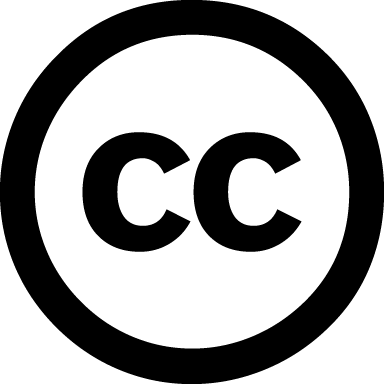Creative Commons Licensing
OER authors typically apply Creative Commons (CC) licenses to their work as an alternative to traditional copyright. CC licenses are designed to protect creators' rights while explicitly allowing for others to engage in the 5R activities. Once a CC license has been applied, it cannot be revoked.
There are six main CC licenses that can be applied to works. Two additional tools release work directly into the public domain, either by its creator or for older works where the license term has expired internationally.
Use the menu below to learn about each CC license and public domain tool.
Creative Commons License Compatibility
If you choose to adapt CC-licensed materials into a new work, you must check to ensure that the licenses are compatible with one another.
- Works marked as SA are only compatible with other works that have the SA element or are more permissive, such as BY only.
- Works marked as NC are only compatible with other works that have the NC element or are more permissive, such as BY only.
- Works marked as ND are incompatible with all other licenses when an adaptation is shared publicly. Works may still be adapted for personal use.
The chart below summarizes which licenses can be used together.

CC License Compatibility Chart by Creative Commons, used under Creative Commons Attribution 4.0 International license.
-
Accessible Creative Commons License Compatibility TableThis spreadsheet is an accessible version of the CC license compatibility table.
Choosing a License
After you've adapted or created an OER, it is time to apply a Creative Commons license! You can't revoke a CC license once it is assigned, so choose wisely.
The tools below can help you decide what's best for your work.
-
Creative CommonsWe recommend looking at Creative Commons directly to see which licenses would work best for your needs.
-
Considerations for licensors and licenseesThis list sets out some basic things that you should think about before you apply a Creative Commons license to your material, or use Creative Commons-licensed material.
-
CC License ChooserThe official CC License Chooser walks you through applying the appropriate license for your OER.
Publications on Creative Commons
-
Creative Commons for Educators and Librarians by
ISBN: 9780838919460Publication Date: 2019-12-17Knowing your way around CC will help you make the most of the Open Access (OA) and open educational resources (OER) movements. This book represents the first-ever complement to the CC Certificate program, providing in-depth coverage of CC licenses, open practices, and the ethos of the Commons. Inside readers will find guidance on the layers and elements of CC licenses, with clear explanations on how they interact; reusing, revising, and remixing; how to acknowledge the underlying work in a remix; techniques for locating works in the public domain and communicating their value; supporting learners' access to a wide array of open knowledge resources in primary, secondary, and higher education; assessing institutional policies for open education, plus advice on revising these policies; ways to adapt existing openly licensed materials in order to keep your institution's knowledge base relevant and up to date; how to meet the open licensing requirements increasingly present in government and foundation grants and contracts; and hundreds of authoritative resources for additional learning. This book is published under a Creative Commons Attribution 4.0 International license (CC BY). -
 Open Content - A Practical Guide to Using Creative Commons Licences
by
Publication Date: 2014"Open Content - A Practical Guide to Using Creative Commons Licences" was published by Wikimedia Deutschland, the German Commission for UNESCO and the North Rhine-Westphalian Library Service Centre (hbz) in 2014. Its intention is to provide interested individuals and organisations with practical guidelines for the use and application of open content licences: How do open content licences work? How do I choose the most suitable licence for my individual needs? Where can I find open content online? These are only some of the questions which these guidelines try to answer. Thanks to Dr. Till Kreutzer for writing these valuable guidelines.
Open Content - A Practical Guide to Using Creative Commons Licences
by
Publication Date: 2014"Open Content - A Practical Guide to Using Creative Commons Licences" was published by Wikimedia Deutschland, the German Commission for UNESCO and the North Rhine-Westphalian Library Service Centre (hbz) in 2014. Its intention is to provide interested individuals and organisations with practical guidelines for the use and application of open content licences: How do open content licences work? How do I choose the most suitable licence for my individual needs? Where can I find open content online? These are only some of the questions which these guidelines try to answer. Thanks to Dr. Till Kreutzer for writing these valuable guidelines. -
 Creative Commons Certificate for Educators, Academic Librarians and GLAM
by
Publication Date: 2020This book contains the curriculum for the Creative Commons Certificate program. Useful for studying sans certification.
Creative Commons Certificate for Educators, Academic Librarians and GLAM
by
Publication Date: 2020This book contains the curriculum for the Creative Commons Certificate program. Useful for studying sans certification.
Credits
Information on this page was adapted from Creative Commons, "About the Licenses," "Public Domain Mark", and "Frequently Asked Questions", and is used under a Creative Commons Attribution 4.0 International license.

 CC BY: Attribution 4.0 International
CC BY: Attribution 4.0 International CC BY-SA: Share-Alike 4.0 International
CC BY-SA: Share-Alike 4.0 International CC BY-NC: Attribution, Non-Derviatives 4.0 International
CC BY-NC: Attribution, Non-Derviatives 4.0 International CC BY-NC: Attribution, Non-Commercial 4.0 International
CC BY-NC: Attribution, Non-Commercial 4.0 International CC BY-NC-SA: Attribution, Non-Commercial, Share-Alike 4.0 International
CC BY-NC-SA: Attribution, Non-Commercial, Share-Alike 4.0 International CC BY-NC-ND: Attribution, Non-Commercial, No Derivatives 4.0 International
CC BY-NC-ND: Attribution, Non-Commercial, No Derivatives 4.0 International CC0: Public Domain
CC0: Public Domain Public Domain Mark 1.0 Universal
Public Domain Mark 1.0 Universal